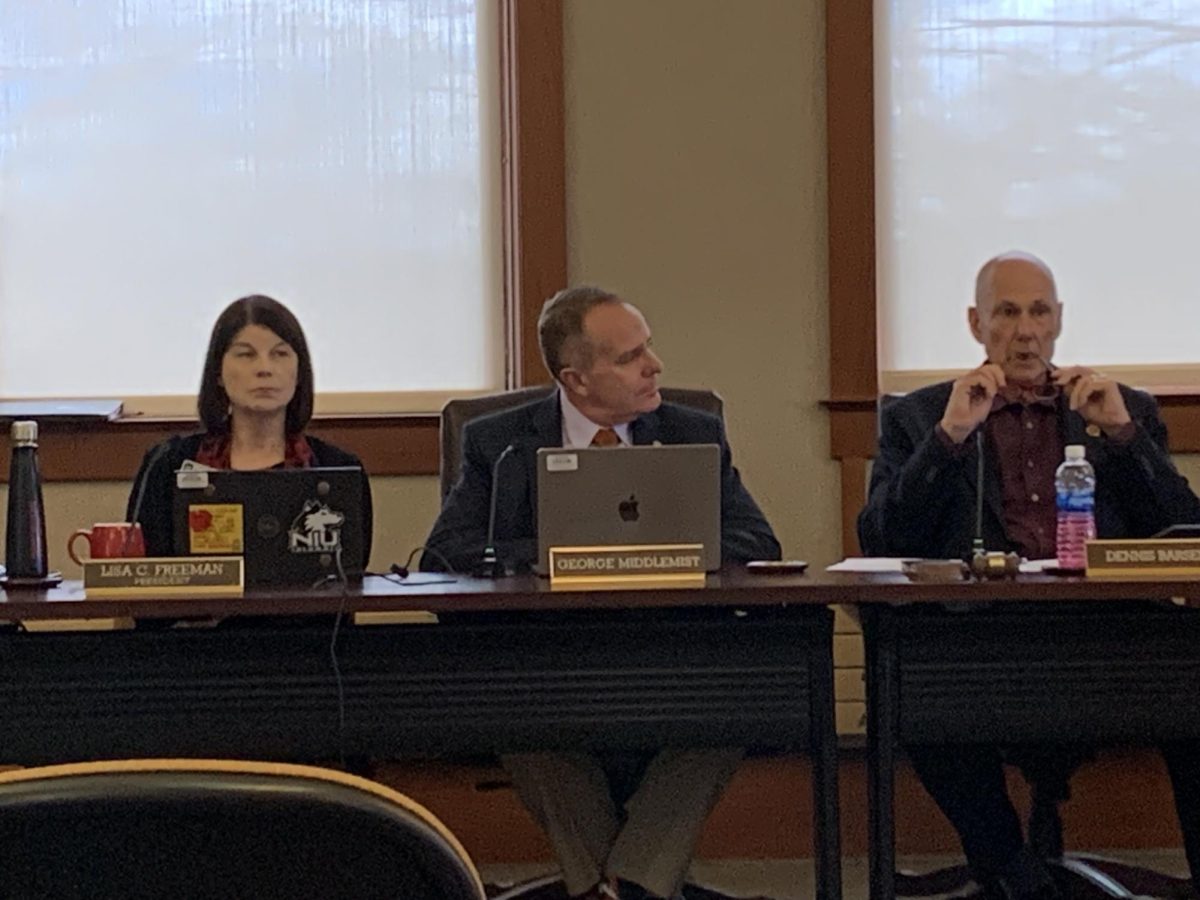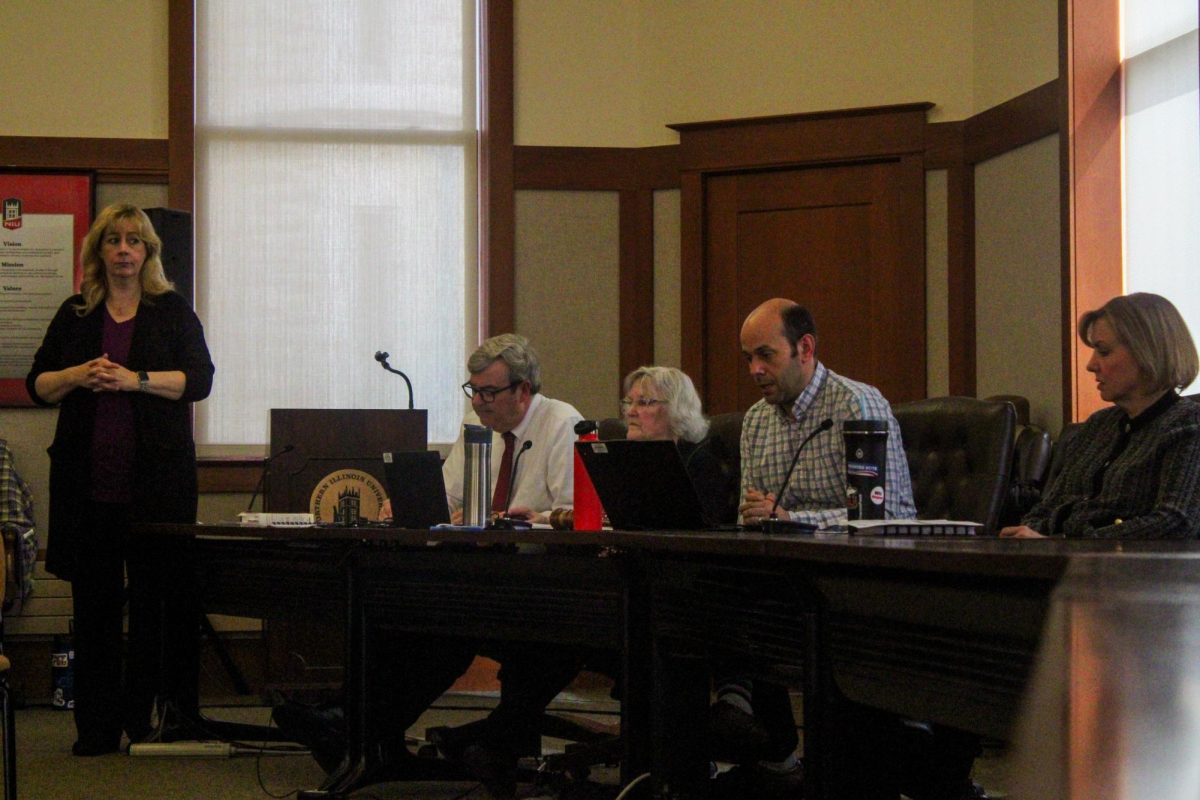DeKALB – While NIU expects a $2 million increase to its now budgeted $33.7 million deficit, the projected 2024 fiscal year deficit could bring the total down.
NIU’s Finance, Audit, Compliance, Facilities and Operations Committee met Thursday to review the quarterly financial summary for the 2024 fiscal year and voted on changes to university rates for the 2025-2026 school year.
The university projects its total expenses to be $435.1 million and its total revenue to be $401.4 million, resulting in a $33.7 million deficit.
The board attributed the additional $2 million to strategic investment expenses that emerged during the first half of the fiscal year.
Comparatively the projected deficit of the university saw a $4 million drop, resulting in a projected $27.9 million deficit for the fiscal year.
Dennis Barsema, board secretary for the Board of Trustees complimented the university’s work to limit its losses where it maintained the same revenue as the previous quarter.
“Shared leadership and fiscal responsibility are critical as we work towards the end, and at our deficit and ultimately developing a balanced multi-year budget,” Barsema said.
UNDERGRADUATE TUITION INCREASES, GRADUATE AND LAW STAY STILL
Base undergraduate tuition rates will increase by 4.5% with no change in undergraduate differential tuition rates.
Arriving students taking 12 credit hours will pay an increase of $220 per semester or $440 for the combined fall and spring semesters. Students currently enrolled will not be affected by the increase due to the Truth in Tuition Law.
The tuition increase is still the smallest increase NIU has seen in the span of the last nine fiscal years and compared to 12 other Illinois public universities, according to George Middlemist, vice president and chief financial officer. NIU has also held its base tuition flat in seven of the last nine fiscal years including FY 2024.
Despite the increase, NIU’s AIM HIGH Huskie Pledge currently exempts 43.1% of NIU undergraduates from paying tuition or fees. The board highlighted the percentage was expected to increase since the qualifications for students’ household income thresholds changed from $75,000 to $100,000.
NIU graduate and law student tuition will stay at the same rate.
RESIDENCE HALL RESIDENTS TO SEE 5.3% RATE INCREASE
Nearly every residence hall except for Neptune North and West will see a 5.3% average increase in room and board rates.
Students planning to live in a resident hall will pay around a $300 increase to their current rate for the 2024-2025 school year.
The board attributed the increase to a necessary accommodation to an increase in food costs, minimum wage, updated contracted wages for staff working for the Housing and Residential Services or Campus Dining Services.
Neptune North and West residents will have a slightly smaller rate increase of 3.6% due to the lack of air conditioning in several of the rooms.
COLLEGE OF LAW RAISES GRADUATION FEE
The Board of Trustees voted to raise the College of Law graduation fee for the first time in 20 years.
The new fee rate will be paid by all third-year law students in the fall semester and will be $150 and go into effect on Aug. 16, according to Middlemist.
The board increased the graduation amount in hopes of meeting the rising operational costs that matched the increasing quality for the commencements in recent years.
The latest increase to the graduation rate was in 2004 when law students paid $75 per student.
NIU CHANGES STUDENT HEALTH INSURANCE PROVIDER
Students relying off of the health insurance plan provided by NIU will see a 6.3% increase in premium for those who are enrolled.
Students will now pay $1,378 and $80 increase from last year’s premium.
The increase was due to the school switching to a new insurance carrier, United Healthcare, and because of the increase of students enrolling in NIU’s healthcare.
Middlemist said many students enrolled in 2021 after the pandemic when families lost insurance coverage or lost crucial benefits from their providers.
“The thing to remember is this year, in 2022, we were coming out of the pandemic and so many families that had lost insurance,” Middlemist said. “Also a lot of things that you would have asked for insurance to pay for support we weren’t able to do in fiscal year 2020-2021.”






















